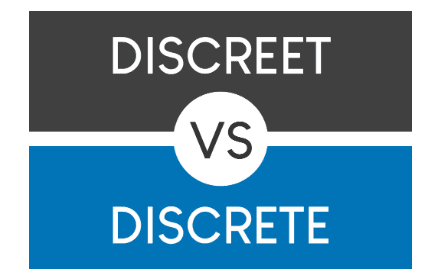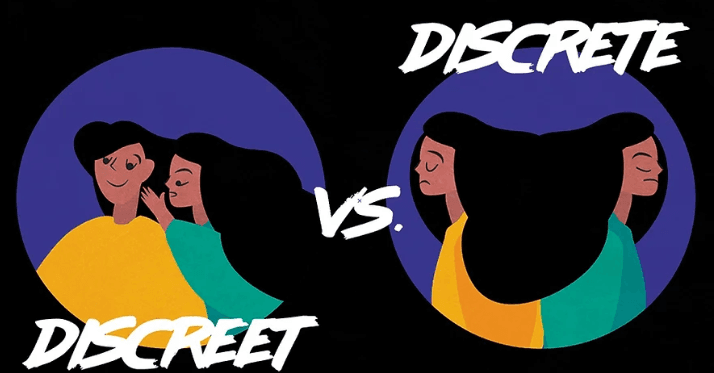Discreet vs Discrete: A Comprehensive Guide for Indian English Learners

Have you ever wondered about the similarities between the words discreet and discrete? They may look and sound similar, but their meanings are completely different! If English is not your first language, you might find such words confusing. This can also lead to communication gaps. Mastering their usage can be a game-changer in your communication skills.
Figuring out the difference between 'discreet' and 'discrete' is important. This blog post will help you understand the distinction between these tricky words. We'll give you clear explanations, examples, and exercises to make sure you never mix them up again. So let's get started!
What are Discreet and Discrete?
Let's start by understanding the basics of discreet vs discrete meanings. The words "discreet" and "discrete" are homophones. This means that they have the same pronunciation. But their meanings are different.
'Discreet' is an adjective. It refers to someone who is careful in their speech or actions. This is usually to avoid causing offence or embarrassment or gaining attention. For example, "She was discreet in her inquiry about the job vacancy."
'Discrete', also an adjective, means separate and distinct. For example, "There are several discrete sections to this vast building."
Here's a comparison table to clarify the differences:
Word | Meaning | Example |
Discreet | Being careful and guarded in one's words or actions | "She sent a discreet message to her colleague." |
Discrete | Separate or distinct | "The children sorted their toys into discrete bins based on colour and size." |
Remembering the difference between these two is crucial. Using one when you mean the other can result in serious misunderstandings! So next time you need to use discreet vs discrete in a sentence, remember this guide!
Why Do We Confuse Discreet with Discrete?
Discreet and discrete are classic examples of homophones. Homophones are words that sound identical but have different meanings. Even the spellings of these words are very similar except for the position of the final two letters.
Similar pronunciation can mix up our understanding and lead to confusion. This is especially true for non-native English speakers. This is due to the lack of exposure to these words in daily conversations or texts. Without familiarity with their usage, it's tough to master the meaning of discreet vs discrete. Books, newspapers and English movies can help in familiarising yourself with these words.
There are many other confusing homophones in English. You can find Clapingo blogs that provide guidelines for their usage. This includes homophones like 'their vs there' and 'stationary vs stationery'.
Practical Exercises: Mastering the Meaning of Discreet and Discrete
Let's put your knowledge of 'discreet' and 'discrete' to the test. Here are five exercises to test your understanding of the use of discreet vs discrete in a sentence:
The officer was __________ about his investigation.
The __________ categories in the survey helped gather clear data.
He made a __________ exit from the party, not wanting to disturb others.
Mathematics deals with __________ variables and constants.
She passed on the secret message in a __________ manner.
Now, let's check your answers:
The officer was discreet about his investigation.
The discrete categories in the survey helped gather clear data.
He made a discreet exit from the party, not wanting to disturb others.
Mathematics deals with discrete variables and constants.
She passed on the secret message in a discreet manner.
Did you select the right words? Remember, practice makes perfect! Each correct use reinforces your understanding of 'discreet vs discrete'.
How Can Clapingo Help?
English is a language with a vast vocabulary. Confusing 'discreet' and 'discrete' may seem like a small mistake. But it can change the entire meaning of a statement. This often leads to misunderstandings. For example, if you were to write, “Please be discrete,” when you actually meant, “Please be discreet.” The first sentence implies that you're asking someone to separate or distinguish themselves. This is quite the opposite of what you intended!
Such errors may seem silly to some. But they can have serious impacts on your personal and professional communication. They can create confusion about your intentions. Others may also question your language fluency. These issues could affect your path to expressing yourself with confidence.
But don't worry! Clapingo is here to help. Clapingo focuses on enhancing your fluency and understanding of complex language rules. The expert tutors at Clapingo offer personalised English language coaching through one-on-one sessions. These tailored lessons address specific areas such as pronunciation, sentence structure and vocabulary. This also includes the correct usage of terms like 'discreet' and 'discrete.'
Check out this YouTube video to learn more:
Final Thoughts

As we wrap up, it's crucial to remember a few points. 'Discreet' refers to being careful or guarded in one's speech or actions. 'Discrete' means distinct or separate things. These small differences in spelling can change the meaning of the entire sentence. The tips and exercises we've explored will guide you towards mastering these terms. But, true fluency comes with practice and personalised guidance. As such, we recommend Clapingo's one-on-one coaching sessions. With these sessions, you can practice language usage without the fear of judgment.
Start with understanding the small yet significant difference between discreet vs discrete. Take charge of your English learning journey today!
FAQs
1. Does discreet mean secret?
Yes, 'discreet' can imply secrecy. It often involves being careful not to cause embarrassment or attract undue attention.
2. How do you use the word discrete?
Use 'discrete' when referring to separate or distinct entities. For example, "They divided the project into discrete phases."
3. Are discreet and discrete interchangeable?
No. 'Discreet' and 'discrete' have similar spellings but different meanings. They are not interchangeable.
Comments
Your comment has been submitted